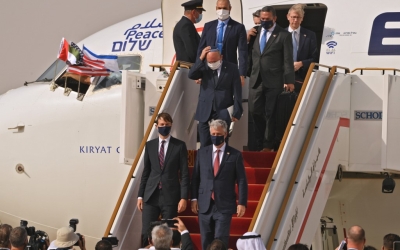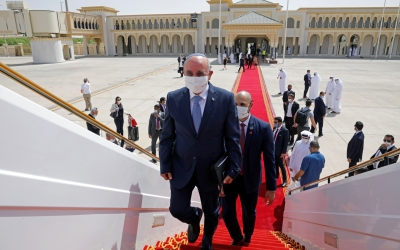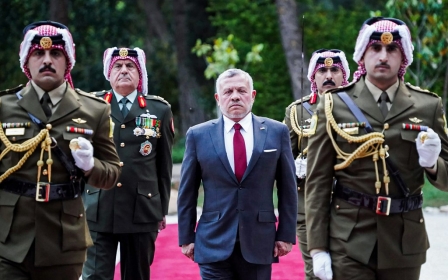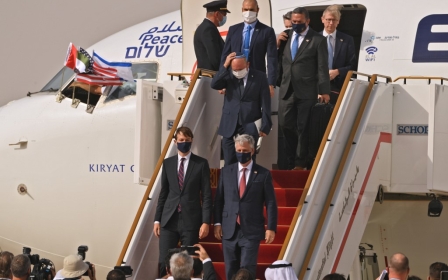Hamas chief in Lebanon to meet with Palestinian factions
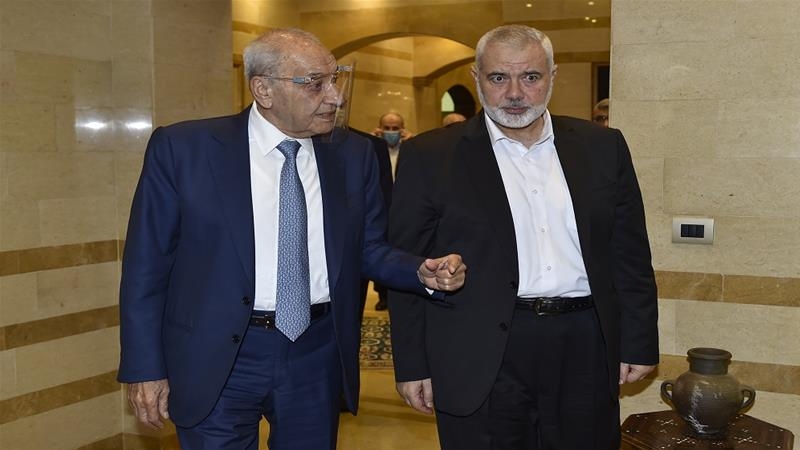
Hamas chief Ismail Haniyeh arrived in Beirut on Wednesday for a week-long visit that will see him meet with Palestinian factions to discuss the growing ties between Israel and Arab states and seek to "end divisions" between rival groups.
Haniyeh's visit, his first to Lebanon in 27 years, comes after a 13 August announcement that Israel and the United Arab Emirates have agreed to normalise ties.
He was received by Lebanese Parliament Speaker Nabih Berri at the capital's Ain el-Tineh Palace.
On Thursday, Haniyeh will meet representatives of other Palestinian factions in rare talks on how to respond to such accords and US President Donald Trump's Middle East plan, said the movement's representative in Lebanon, Ali Baraka.
The meeting at the Palestinian embassy in Beirut will coincide with talks in Ramallah between Palestinian President Mahmoud Abbas and representatives of Palestinian factions there.
Thursday's joint discussions in Ramallah and Beirut aim to develop "a unified Palestinian strategy to confront normalisation schemes... and to reject plans to annex the West Bank as well as [Trump's] 'deal of the century'," Baraka told AFP.
'New page'
Speaking to AFP from Ramallah, Ahmad Majdalani, a member of the executive committee of the Palestine Liberation Organisation, said the talks also sought to boost ties between the factions.
They aim "to open a new page, to end divisions, achieve national reconciliation and build a national partnership between all factions," he said.
The Palestinian embassy in Lebanon said that a part of the meeting was organised in Lebanon because most participating officials were residing either in Beirut, Syria or Ramallah.
Baraka justified the choice of Lebanon by saying the country is a supporter of the Palestinian cause and has a large population of Palestinian refugees who would be adversely affected by Trump's plan.
The last time most heads of Palestinian factions held joint talks was in 2013 in Cairo.
'Many more unpublicised meetings'
Under the US plan unveiled this year, Israel would retain control of the disputed city of Jerusalem as its "undivided capital" and annex settlements and other areas in the occupied West Bank.
Since the 1967 Middle East war, Israel has annexed East Jerusalem and the Syrian Golan Heights in moves never recognised by the international community, occupied the West Bank and besieged the Gaza Strip.
On 13 August, Trump announced an agreement between the UAE and Israel to normalise ties.
Under the US-brokered deal, Israel has suspended, but not permanently dropped, annexation plans.
The UAE became the third Arab country to agree to normalise ties with Israel, after Egypt signed a peace deal in 1979 and Jordan followed suit in 1994.
Israeli Prime Minister Benjamin Netanyahu said on Sunday that "there are many more unpublicised meetings with Arab and Muslim leaders to normalise relations with the state of Israel".
The Palestinians have denounced the normalisation deal, which they say violates a longstanding pan-Arab position that Israel could normalise relations only in return for land.
Israel exchanged embassies with neighbours Egypt and Jordan under the earlier peace deals.
But until now, all other Arab states had demanded it first cede more land to the Palestinians.
Middle East Eye delivers independent and unrivalled coverage and analysis of the Middle East, North Africa and beyond. To learn more about republishing this content and the associated fees, please fill out this form. More about MEE can be found here.


